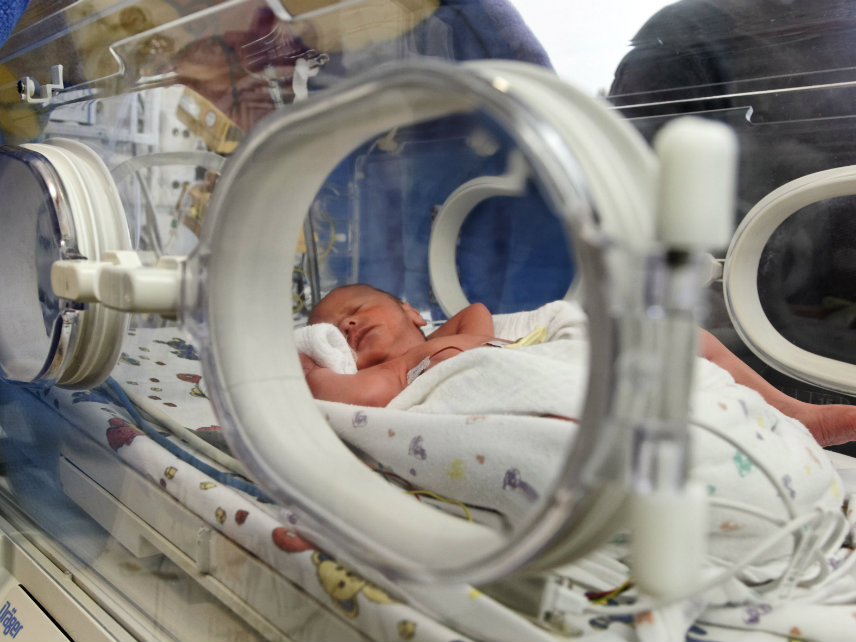Virginia House Approves Limited Regulatory Reforms for Hospitals, Mental Health Clinics
Virginia's Certificate of Public Need laws drive up costs and limit access to care, but there's little political will for widespread reform or repeal.

Today the Virginia House of Delegates passed a pair of narrowly tailored reforms to state rules that artificially limit the supply of health care for critically ill infants and psychiatric patients.
Virginia is one of 30 states where Certificate of Public Need (COPN) laws limit the availability of a wide range of medical services. If a hospital wants to build a new surgical facility, install a new MRI machine, or offer specialty care for sick infants, it first has to get permission from the state Department of Health. Before 2015, Virginia hospitals had to get permission just to add new parking spaces.
In practice, hospitals use the law to limit the competition they face. Last year, Reason highlighted the tragic consequences with the story of an infant who died at Lewis-Gale hospital in Roanoke, Virginia. The hospital had twice applied for a COPN license to build a neonatal intensive care unit, but both times had been rejected by the state. In both instances, a cross-town rival hospital (which advertises itself as having the only NICU in southwestern Virginia) successfully lobbied to have the applications blocked, even though Lewis-Gale had the support of local officials, civic leaders, doctors, nurses, and residents.
One of the bills passed today would directly address that conflict by exempting hospitals in the Roanoke area ("Planning Region 5" in state bureaucratese) from COPN rules that require the state to assess the impact of competition on other hospitals. The exemption only applies to hospitals seeking a COPN license to build a NICU.
It's a classic government move, one that responds to the most recent crisis in a way that may placate the immediately aggrieved interests but does nothing to prevent something similar from happening somewhere else. If the bill clears the Senate and gets a signature from Gov. Ralph Northam, a Democrat, Lewis-Gale will finally get to build its NICU but the state COPN regime will remain in full force for everyone else.
State Rep. Sam Rasoul (D-Roanoke) urged his colleagues to vote against a bill that did little to fix the underlying problems.
"We aggressively need COPN reform," Rasoul said. "But this specific bill is a carve-out."
The other bill is slightly broader, but it still represents only a small change to Virginia's COPN rules. Under the terms of HB 1606, psychiatric facilities would be exempt from the COPN process if they wanted to purchase additional beds to expand access to care.
There are more than a dozen COPN reform bills kicking around in the Virginia legislature this year. Most deal with small exemptions for particular services or geographic areas rather than wholesale changes or repeal.
That's unfortunate, because Virginia's COPN laws have real, if somewhat hidden, consequences for residents of the state. A 2015 study by the Mercatus Center, a free market think tank, found that there are 131 fewer hospital beds per 100,000 people in Virginia when compared to the rest of the United States. Virginia also has fewer hospitals offering MRI services and CT scans than national averages. Hospital beds, MRI machines, and CT scanners are all subject to COPN licensing in Virginia, which means adding those services can be costly and difficult.
States with some form of COPN laws for hospitals have higher mortality rates for patients with pneumonia, heart failure, and heart attacks than states without such restrictions, according a separate Mercatus Center study published in 2016. The Federal Trade Commission and the Justice Department have found that COPN laws "raise considerable competitive concerns and generally do not appear to have achieved their intended benefits for health care consumers," while allowing hospitals and other large health care providers to inflate costs.
It's heartening to see that COPN laws are losing some of their grip in Virginia, but it's a shame that lawmakers are unwilling to do more than chip at parts of the system.
"If policy makers are interested in increasing access to care, increasing the quality of care, and reducing the cost of care, the evidence is quite clear that CON laws should be entirely eliminated," Matt Mitchell, a senior research fellow at Mercatus, told Reason. "Unfortunately, political incentives don't encourage wholesale repeal. Instead, they encourage piecemeal exceptions granted to highly organized individuals."


Show Comments (8)